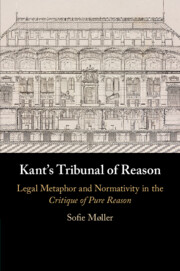Book contents
- Kant’s Tribunal of Reason
- Kant’s Tribunal of Reason
- Copyright page
- Dedication
- Contents
- Acknowledgements
- Abbreviations
- Introduction
- Chapter 1 The Critique of Pure Reason as the Establishment of Reason’s Lawful Condition
- Chapter 2 The Normativity of Law
- Chapter 3 The Transcendental Deduction of the Categories and the Tradition of Legal Deductions
- Chapter 4 The Question of Fact and the Question of Law in Judicial Imputation and in the Transcendental Deduction of the Categories
- Chapter 5 The Tribunal of Reason
- Chapter 6 Moral Conscience as the Practical Inner Tribunal
- Chapter 7 Distinguishing between Rightful Claims and Groundless Pretensions
- Chapter 8 Epistemic Authority as both Individual and Collectively Shared
- Chapter 9 Systematicity and Philosophy as the Legislation of Reason
- Conclusion
- Bibliography
- Index
Introduction
Published online by Cambridge University Press: 24 February 2020
- Kant’s Tribunal of Reason
- Kant’s Tribunal of Reason
- Copyright page
- Dedication
- Contents
- Acknowledgements
- Abbreviations
- Introduction
- Chapter 1 The Critique of Pure Reason as the Establishment of Reason’s Lawful Condition
- Chapter 2 The Normativity of Law
- Chapter 3 The Transcendental Deduction of the Categories and the Tradition of Legal Deductions
- Chapter 4 The Question of Fact and the Question of Law in Judicial Imputation and in the Transcendental Deduction of the Categories
- Chapter 5 The Tribunal of Reason
- Chapter 6 Moral Conscience as the Practical Inner Tribunal
- Chapter 7 Distinguishing between Rightful Claims and Groundless Pretensions
- Chapter 8 Epistemic Authority as both Individual and Collectively Shared
- Chapter 9 Systematicity and Philosophy as the Legislation of Reason
- Conclusion
- Bibliography
- Index
Summary
Kant illustrates the Critique of Pure Reason with an intricate collection of legal images; the whole work is populated with laws, judges, lawyers, tribunals, legislators, witnesses and many other references to legal theory and practice. Both the critique of pure reason and reason as such are described as legislator, judge and tribunal. In the A edition’s preface, we learn that the task of a critique of reason is to institute a tribunal which is ‘none other than the critique of pure reason itself’ (A xii). In order to function as a court of justice, the critique of pure reason must also act ‘as wise legislators do’ (A 424/B 452) and revise proposed laws when they lead to contradictory judgements. Our approach to nature must be ‘like an appointed judge who compels witnesses to answer the questions he puts to them’ (B xiii). The critique of pure reason thus investigates whether reason can legislate and judge legitimately.
- Type
- Chapter
- Information
- Kant's Tribunal of ReasonLegal Metaphor and Normativity in the <I>Critique of Pure Reason</I>, pp. 1 - 15Publisher: Cambridge University PressPrint publication year: 2020

